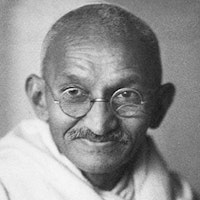To call woman the weaker sex is a libel; it is man’s injustice to woman…. If nonviolence is the law of our being, the future is with woman.
Mohandas K. Gandhi

The Future Is With Women
Topic: Justice, Vision, & Leadership
“To call woman the weaker sex is a libel; it is man’s injustice to woman. If by strength is meant brute strength, then, indeed, is woman less brute than man. If by strength is meant moral power, then woman is immeasurably man’s superior. Has she not greater intuition, is she not more self-sacrificing, has she not greater powers of endurance, has she not greater courage? Without her, man could not be. If nonviolence is the law of our being, the future is with woman. Who can make a more effective appeal to the heart than woman?”
Mohandas Karamchand Gandhi, known universally as Mahatma Gandhi, was born on October 2, 1869, in Porbandar, a small town on the western coast of India. He hailed from a Hindu merchant caste family and his father served as the chief minister of Porbandar state. Gandhi's youth was shaped by deeply spiritual influences that stemmed from his mother's devout Jainism, which instilled in him beliefs in non-violence, fasting, meditation, and vegetarianism. As a young man, Gandhi travelled to London to study law, an experience that further broadened his perspective and exposed him to Western ideas of justice and equity.
Returning to India after completing his studies, Gandhi found himself dissatisfied with the legal profession and soon moved to South Africa to work on a legal case. It was in South Africa, faced with rampant racial discrimination, that Gandhi began to refine the philosophy of non-violent resistance, or Satyagraha, a principle deeply rooted in his religious beliefs. For nearly 21 years, Gandhi strove for the civil rights of Indians in South Africa, successfully employing methods of civil disobedience and passive resistance.
In 1915, Gandhi returned to India, bringing with him his deeply entrenched ideas of Satyagraha. He assumed leadership of the Indian National Congress and led nationwide campaigns for easing poverty, expanding women's rights, ending untouchability, and achieving Swaraj, or self-rule. His role in the Indian independence movement was monumental, with his leadership and doctrines of non-violent resistance culminating in India's independence from British rule in 1947. However, his life was tragically cut short when he was assassinated on January 30, 1948. His legacy, nonetheless, continues to inspire peace movements globally, securing his place as one of the most significant figures of the 20th century.
Young India
Gandhi, Mohandas K. “Mahatma Gandhi.” Wikiquote, en.wikiquote.org/wiki/Mahatma_Gandhi, [Mohandas K. Gandhi, "Young India," 1930].

Mohandas K. Gandhi
Copyright © 2017 – 2025 LuminaryQuotes.com About Us

Mohandas K. Gandhi
Mohandas Karamchand Gandhi (2 October 1869 – 30 January 1948), commonly known as Mahatma Gandhi (In Sanskrit mahātmā means “Great Soul”).
Additional Mohandas K. Gandhi Quotes
“I am uncompromising in the matter of woman’s rights. In my opinion she should labor under no legal disability not suffered by man, I should treat the daughters and sons on a footing of perfect equality.”
–Mohandas Gandhi, 17th October 1929 [Quoted in Gandhi: The Essential Writings, Judith M. Brown, Oxford University Press, 1998] pp. 228-9.
“To see the universal and all-pervading Spirit of Truth face to face one must be able to love the meanest of creation as oneself. And a man who aspires after that cannot afford to keep out of any field of life. That is why my devotion to Truth has drawn me into the field of politics; and I can say without the slightest hesitation, and yet in all humility, that those who say that religion has nothing to do with politics do not know what religion means.
Identification with everything that lives is impossible without self-purification; without self-purification the observance of the law of Ahimsa must remain an empty dream; God can never be realized by one who is not pure of heart. Self-purification therefore must mean purification in all the walks of life. And purification being highly infectious, purification of oneself necessarily leads to the purification of one’s surroundings.
But the path of self-purification is hard and steep. To attain to perfect purity one has to become absolutely passion-free in thought, speech and action; to rise above the opposing currents of love and hatred, attachment and repulsion. I know that I have not in me as yet that triple purity, in spite of constant ceaseless striving for it. That is why the world’s praise fails to move me, indeed it very often stings me. To conquer the subtle passions seems to me to be far harder than the physical conquest of the world by the force of arms. Ever since my return to India I have had experiences of the dormant passions lying hidden within me. The knowledge of them has made me feel humiliated though not defeated. The experiences and experiments have sustained me and given me great joy. But I know that I have still before me a difficult path to traverse. I must reduce myself to zero. So long as a man does not of his own free will put himself last among his fellow creatures, there is no salvation for him. Ahimsa is the farthest limit of humility.”
–Mohandas K. Gandhi [Farewell] p. 454.